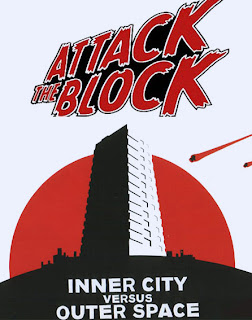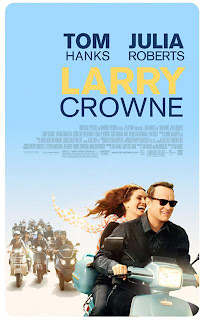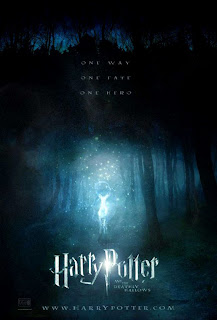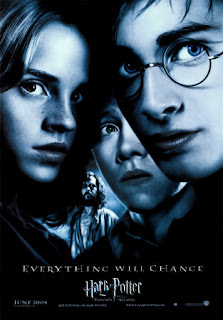As I sat down for my midnight showing of “Harry Potter and the Deathly Hallows Part II”, I was struck by the realization that never again would I bear witness to a new entry into the “Potter” canon. 1050 minutes of film, 4100 pages of reading, a dozen or so beloved character deaths, approximately 100 trillion worldwide blog posts, and at least 30, “I’m not crying, I just have allergies that happen to only pop up when I watch these films or read these books” moments from this guy led to the final chapter of an incredible saga that amazingly felt much shorter than I would have liked. I could easily have taken on another three or four films and a dozen more books if JK Rowling had desired to extend the series. Harry Potter has been a part of my life for 10 years now with six of those years counting toward a type of total, all-encompassing devotion that is usually reserved for religious zealots and Trekkies. To know when the lights go down that, as the promotional posters read, “It All Ends” in just two short hours is an odd sensation; a mix of excitement for the story to be brought to life and of sadness that I won’t be sitting in this same seat a year from now, ready for the next chapter. After it’s all said and done, I’m left with the task of summing up a worldwide phenomenon in a thousand words or less and knowing that I could never do it justice. With that in mind, I ask for the forgiveness of non-Potter fans for the foolish blathering that is about to take place and from fellow Potterites for what will surely be an unfitting send off for the series that we have loved so much. Accio review.
 “Deathly Hallows 2” literally opens right where “Part 1” left off with Harry (Daniel Radcliffe), Ron (Rupert Grint), and Hermione (Emma Watson) staying at the home of Bill and Fleur Weasley. Their time is spent plotting their next step on the road to finding and destroying all of Voldemort’s (Ralph Fiennes) Horcruxes, thereby making him mortal once more. (For the uninitiated, a Horcrux is an item that contains a piece of ones’ soul which would allow a person to return to life after death.) What starts as a simple break-in to the heavily secured Gringotts Bank turns into a haphazard and death-defying escape on the back of dragon, followed by the discovery that Voldemort knows of their plot. After racing to Hogwarts, the school they once called home and the location of a Horcrux, Harry and his friends find themselves confronted by the great villain himself, resulting in an all-out war that ultimately risks the balance of good and evil in the wizarding world.
“Deathly Hallows 2” literally opens right where “Part 1” left off with Harry (Daniel Radcliffe), Ron (Rupert Grint), and Hermione (Emma Watson) staying at the home of Bill and Fleur Weasley. Their time is spent plotting their next step on the road to finding and destroying all of Voldemort’s (Ralph Fiennes) Horcruxes, thereby making him mortal once more. (For the uninitiated, a Horcrux is an item that contains a piece of ones’ soul which would allow a person to return to life after death.) What starts as a simple break-in to the heavily secured Gringotts Bank turns into a haphazard and death-defying escape on the back of dragon, followed by the discovery that Voldemort knows of their plot. After racing to Hogwarts, the school they once called home and the location of a Horcrux, Harry and his friends find themselves confronted by the great villain himself, resulting in an all-out war that ultimately risks the balance of good and evil in the wizarding world.
For my money there is but one knock against “DH2”: because it is a “part two”, the opening sequences are tough to get a grasp of. There is absolutely no lead up in this film; there’s not even a set of opening credits. The Warner Brothers logo comes on screen and five seconds later we see the gravestone of Dobby the house elf and then jump directly into Harry planning the break-in at Gringotts. You don’t get the set-up that is so expertly crafted both in Rowling’s novels and in the other film adaptations. It takes a few minutes to feel comfortable in “DH2”, even for a hardened fan of the series who knows exactly what has happened and what is yet to come. This discomfort isn’t a matter of bad execution or poor storytelling; it’s just the inherent nature of essentially taking a long film and cutting it in two.
This is, however, an extremely minor and inconsequential issue that will be forgotten in the years ahead. In my mind, I know I will combine “Deathly Hallows” into one movie, just like the book, and will likely always watch part two immediately after part one, just like I do with the extended cuts of the “Lord of the Rings” films. Nearly everything else about this film is perfect. This is what I hoped for when I read “Deathly Hallows”, an action packed, emotionally charged epic that brings to life the very best of the heroes and the very worst of the villains. With Harry gone, Neville Longbottom (Matthew Lewis) assumes the position of leader, Minerva McGonagall (Maggie Smith) steps up to display her true powers, and Luna Lovegood (Evanna Lynch) proves to be far wiser than anyone would have imagined. Likewise, the desperation and frustration of Voldemort makes him even more terrifying than before, the years of self-conflict have worn the face of Draco Malfoy (Tom Felton), and the deep deceptions of Severus Snape (Alan Rickman) run just under the surface of his skin, dying to burst forth. The two sides push and prod each other to their highest levels of magical skill. Never in the “Potter” universe has that been more apparent than in the full-scale battle that overtakes the grounds of Hogwarts. To be sure, this is a mesmerizing and fantastic action sequence that combines FX and stunts with flair.
By this point, all of these young actors, Radcliffe, Grint, Watson, and their supporters, have become real actors capable of carrying their individual moments and completely selling the drama and tension of the situations they continually find themselves in. The veteran actors around them, who make up what I have championed in the past as the greatest cast ever assembled, all display the true brilliance of the characters they were provided, working seamlessly to become their parts rather than mere actors playing a role. Just as has been the case throughout the eight films in this series, you don’t watch Alan Rickman, Gary Oldman, Ralph Fiennes, or the rest up on that screen, but rather Severus Snape, Sirius Black, Minerva McGonagall, and their cohorts. Never, however, has this been more apparent, more genuine, than in “DH2.”
 These magnificent characters and esteemed actors are supplemented and highlighted by the geniuses behind the camera. David Yates and Steve Kloves prove once and for all that producer David Heyman was correct in giving the director-writer team the final three chapters of this epic. Kloves wrote a killer screenplay, one that implements every major facet of a huge book in beautiful fashion while adding a comedic undertone through witty banter and solid physical comedy. The combination creates a certain playfulness that has been building throughout the last few “Potter” films but matures spectacularly here. Yates, meanwhile, routinely puts his actors in the right place to succeed. He never asks too much, nor does he cut too early. There is real power in this story, in these relationships, and I think of all the “Potter” directors, Yates did the best when it comes to fleshing those factors out. There are a few differences between the book and the film but they are mostly cosmetic, save for the one involving Snape which, without giving anything away, actually adds to the already spectacular character that he is. This is Snape’s shining moment, the final opportunity for redemption, and Rickman sells the scene with heartbreaking intensity. Of all the great actors in this series, it is perhaps Rickman who most deserves award consideration.
These magnificent characters and esteemed actors are supplemented and highlighted by the geniuses behind the camera. David Yates and Steve Kloves prove once and for all that producer David Heyman was correct in giving the director-writer team the final three chapters of this epic. Kloves wrote a killer screenplay, one that implements every major facet of a huge book in beautiful fashion while adding a comedic undertone through witty banter and solid physical comedy. The combination creates a certain playfulness that has been building throughout the last few “Potter” films but matures spectacularly here. Yates, meanwhile, routinely puts his actors in the right place to succeed. He never asks too much, nor does he cut too early. There is real power in this story, in these relationships, and I think of all the “Potter” directors, Yates did the best when it comes to fleshing those factors out. There are a few differences between the book and the film but they are mostly cosmetic, save for the one involving Snape which, without giving anything away, actually adds to the already spectacular character that he is. This is Snape’s shining moment, the final opportunity for redemption, and Rickman sells the scene with heartbreaking intensity. Of all the great actors in this series, it is perhaps Rickman who most deserves award consideration.
As a general rule, we need our pop culture icons to end well. We want “Return of King”, the third season of “Arrested Development”, and Michael Jordan’s final championship winning shot with the Bulls. Our favorite things should always end on a high. Too often, though, we are treated to “Matrix Revolutions”, the ninth season of “Scrubs”, and Michael Jordan returning with the Washington Wizards. Words cannot express my joy at being able to say that “Deathly Hallows Part II” belongs in the first category, a fitting, compelling, and emotionally ripe end to an era. But to recommend this film isn’t enough. If you haven’t before, I implore you to read these books and see these movies. Take the opportunity now that it’s all over because there are millions of us who would give anything to start fresh and do the whole thing over again.
Grade: A+
My nerdiness obviously knows no bounds,
Brian
 Beyond the vampire-angel conundrum, the only difference between "Priest" and "Legion" is that I actually finished watching "Priest" whereas "Legion" now resides on the very short list of movies I sought out (theater, rental, DVR, etc.) and didn't bother finishing. I have a feeling I would consider "Legion" to be one of the worst movies I've ever seen if I'd been able to sit through the whole movie. "Priest", meanwhile, is just another pretty awful post-apocalyptic vision of the future that does nothing to distinguish itself from every other post-apocalyptic vision of the future. I keep coming back to this type of movie despite the fact that I know 99 percent of them are horrible and I can't seem to make myself stop. If you've ever seen the intervention episode of "How I Met Your Mother", know that I fully expect my friends and family to hold a similar event for me and ask me to stop post-apocalypting myself. But in the end I'd just reject post-apocalyptic rehab. "I'm not addicted! I can quit when I want!" (he quietly sobs while settling in to watch the newest "Resident Evil" movie).
Beyond the vampire-angel conundrum, the only difference between "Priest" and "Legion" is that I actually finished watching "Priest" whereas "Legion" now resides on the very short list of movies I sought out (theater, rental, DVR, etc.) and didn't bother finishing. I have a feeling I would consider "Legion" to be one of the worst movies I've ever seen if I'd been able to sit through the whole movie. "Priest", meanwhile, is just another pretty awful post-apocalyptic vision of the future that does nothing to distinguish itself from every other post-apocalyptic vision of the future. I keep coming back to this type of movie despite the fact that I know 99 percent of them are horrible and I can't seem to make myself stop. If you've ever seen the intervention episode of "How I Met Your Mother", know that I fully expect my friends and family to hold a similar event for me and ask me to stop post-apocalypting myself. But in the end I'd just reject post-apocalyptic rehab. "I'm not addicted! I can quit when I want!" (he quietly sobs while settling in to watch the newest "Resident Evil" movie). 




























